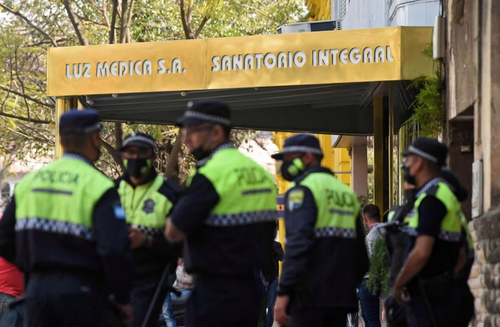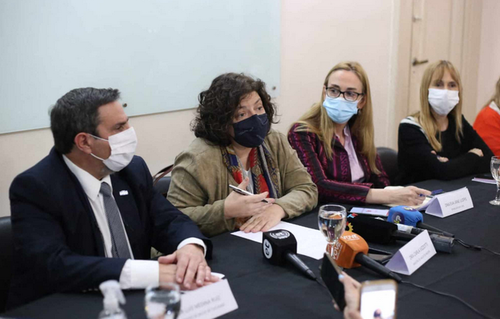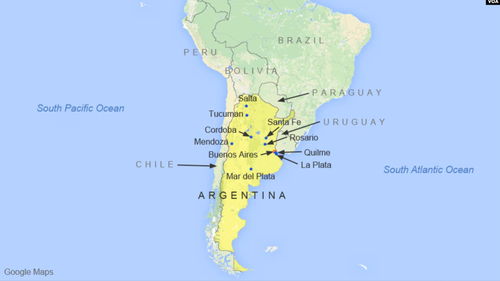
Argentine health officials announced on Saturday that a pneumonia of previously unknown origin has been linked to Legionnaires' disease - a rare bacterial infection of the lungs, after four people in a clinic in northwestern Tucuman province died. Seven others are currently infected.

The cases have been linked to a single private clinic in the northwestern city of San Miguel de Tucumán, according to the WHO's regional office, the Pan American Health Organization (PAHO).
Health Minister Carla Vizzotti told reporters in a Saturday statement that Legionnaires' had been identified as the cause of double pneumonia in the four who died after the rare bacterial infection was initially ruled out, according to a Friday report by Reuters.

On Tuesday, five health care workers and a patient who required intensive care were reported with pneumonia of unknown origin. Their symptoms emerged between Aug. 18 - 22.
Then on Thursday, three more cases were reported by local health officials, bringing the total number to nine, and on Friday and Saturday Argentina reported the 10th and 11th cases.
The most recent death was that of a 48-year-old man with underlying health problems, which followed a 70-year-old woman who had undergone surgery in the clinic.
In total, 11 cases have been identified - nearly all involving clinic staff according to provincial officials. Of the seven under care, "four remain hospitalized, three of them under respiratory assistance, and three are under home surveillance, with less complicated clinical symptoms," said provincial health minister Luis Medina Ruiz on Saturday, who added that "toxic and environmental causes" could not be ruled out - and that the clinic's climate control systems were being checked.

Reported symptoms include fever, muscle and abdominal pain and shortness of breath, with several patients experiencing pneumonia in both lungs.
The disease first appeared in 1976 at a meeting of the American Legion veterans group in Philadelphia, PA, and was linked to contaminated water or unclean air conditioning systems.
When the outbreak first appeared in Tucumán, officials first tested for Covied-19, flu and hantavirus, ruling them all out. Samples were then analyzed by the Malbran Institute in Buenos Aires, which pointed to Legionnaires'.
Argentine health officials announced on Saturday that a pneumonia of previously unknown origin has been linked to Legionnaires’ disease – a rare bacterial infection of the lungs, after four people in a clinic in northwestern Tucuman province died. Seven others are currently infected.

The cases have been linked to a single private clinic in the northwestern city of San Miguel de Tucumán, according to the WHO’s regional office, the Pan American Health Organization (PAHO).
Health Minister Carla Vizzotti told reporters in a Saturday statement that Legionnaires’ had been identified as the cause of double pneumonia in the four who died after the rare bacterial infection was initially ruled out, according to a Friday report by Reuters.

On Tuesday, five health care workers and a patient who required intensive care were reported with pneumonia of unknown origin. Their symptoms emerged between Aug. 18 – 22.
Then on Thursday, three more cases were reported by local health officials, bringing the total number to nine, and on Friday and Saturday Argentina reported the 10th and 11th cases.
The most recent death was that of a 48-year-old man with underlying health problems, which followed a 70-year-old woman who had undergone surgery in the clinic.
In total, 11 cases have been identified – nearly all involving clinic staff according to provincial officials. Of the seven under care, “four remain hospitalized, three of them under respiratory assistance, and three are under home surveillance, with less complicated clinical symptoms,” said provincial health minister Luis Medina Ruiz on Saturday, who added that “toxic and environmental causes” could not be ruled out – and that the clinic’s climate control systems were being checked.

Reported symptoms include fever, muscle and abdominal pain and shortness of breath, with several patients experiencing pneumonia in both lungs.
The disease first appeared in 1976 at a meeting of the American Legion veterans group in Philadelphia, PA, and was linked to contaminated water or unclean air conditioning systems.
When the outbreak first appeared in Tucumán, officials first tested for Covied-19, flu and hantavirus, ruling them all out. Samples were then analyzed by the Malbran Institute in Buenos Aires, which pointed to Legionnaires’.






